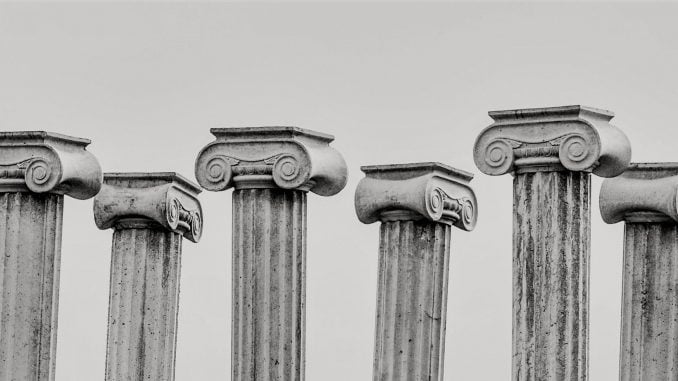
Before we discuss what Classical education is, let’s dispel a few myths about what Classical education is not. For instance, students and faculty in a Classical school are not required to wear togas to class each day. Nor do we have chariot racing or discus throwing in place of basketball or soccer. On the outside, a Classical school looks just like any other school.A Classical education differs from other schools because of our commitment to the “Great Books” of the Western canon, our study of Latin, logic, and rhetoric, and our approach to the humanities and the sciences. If you are considering a new school for your child, you may find the number of options overwhelming. Let’s discuss why these three factors separate a Classical education from other schools and why the Classical approach will help your student develop the skills they need to succeed in life.Classical education makes of first importance the works of the Western canon from Plato and Thucydides to Montesquieu and Montaigne. These “Great Books” include, but are not limited to, the Bible, the works of Plato, Dante, Shakespeare, and other figures from Sumer to modern-day. Reading these works in their entirety takes place in high school, while students in earlier grade levels read excerpts or adaptations, so they can still interact with the characters, storylines, and themes. The Founding Fathers read these works for both school and pleasure, and if we want students to imitate their example, we should give them the books that molded the hearts and minds of our nation’s founders.Keeping in line with the kind of schooling the Founding Fathers enjoyed, most Classical schools offer Latin, logic, and rhetoric. Latin, as an inflected language, requires students to analyze the endings of words to determine their usage in a sentence, while students learn how to construct arguments in logic class and to defend their views in rhetoric. These are tools in the intellectual toolbox a Classical school provides its students, as we hope to teach students how to think, not what to think.However, the biggest perceived drawback of a Classical education is in the sciences. How can an education trapped in Antiquity help students master technical skills needed to compete in a highly competitive global landscape? This view, however, is misleading and can stifle innovation in both science and the humanities. When introducing the iPad 2, Steve Jobs said, “Technology alone is not enough,” because the best technology needs the liberal arts to stoke its creative fires. Jobs even attributed his edge in the tech world to studying calligraphy, not courses in engineering.Classical education already unites the arts and sciences. In history, students study the Scientific Revolution and its prominent figures; in logic, they learn the rules these thinkers applied in studying the natural world; and in science they conduct experiments with Galileo’s boldness and curiosity. At Thales, as with any Classical school, we aim to join the arts and sciences so that students can succeed in any career they choose. I can only speak for Thales, where we offer an engineering elective called the Luddy Institute of Technology that teaches CAD design and chariot building, among other classically inspired projects so we don’t stray too far from our roots. Applied science is a powerful tool for testing information, but a curriculum needs more than just the sciences. To inspire students, we need a curriculum that gave rise to modern science to begin with.A Classical education is as challenging as it is invigorating. The Western tradition is 6,000 years of man’s recorded attempts to discover the true, the good, and the beautiful, and when authors from Cicero to Kant write on such ideals, we should pay attention. An education that is based upon the “Great Books,” equips students with a rich intellectual toolbox, and joins the arts to the sciences is indeed the right fit for your student’s future. As Isaac Newton said that great men stand on the shoulders of giants, a Classical education preserves the giants of the Western canon so students may stand upon their shoulders, survey with confidence the world in which they live, and overcome any challenge thrown at them.Winston Brady is a curriculum adviser and humanities instructor at Thales Academy in Apex, where he has taught for six years.



